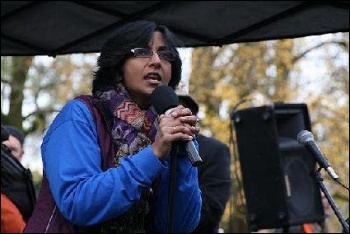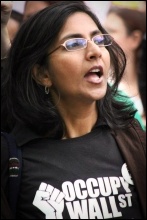Federal shutdown over budget deficit reveals again the need for a new party of the ‘99%’
Kai Stein, Committee for a Workers’ International (CWI)

Kshama Sawant, photo Socialist Alternative
Around 800,000 federal workers are furloughed – sent on holiday without payment. While their families are on zero wages from the federal state, the $174,000 annual income per member of Congress is untouched by the governmental shutdown which started on 1 October.
The Republican majority in the House of Representatives (lower chamber of the parliament) blocked any attempt of Democrat President Barack Obama to get a budget agreed or the old one prolonged.
On the one side, this is an attempt to bring down Obama’s very limited and business friendly healthcare reforms.
On the other side, the US ruling class is confronted with a dysfunctional political system and Republican party. In a sense this is not a new phenomenon, but it has been exacerbated by the recent crisis of capitalism.
The most vicious part of the ruling class previously backed the right-wing populist ‘Tea Party’ Republican movement to fight for their interests. Despite them abandoning this movement in 2010, they do not fully control this Frankenstein monster. Therefore, in general, the Republicans do not act in the best interests of the US ruling class.
Crisis
A three-week government shutdown could cut off 0.9% of GDP (total output), Goldman Sachs predicts. But what Wall Street worries even more about is the possibility of the US reaching the ‘debt ceiling’ around 17 October.
Without new legislation in Congress, the administration could not borrow more money and the US would be unable to meet its debt obligations and technically default – for the first time in its history. A default could spell disaster for the poorest who would be forced to pay for this crisis.
But who is responsible for the expanding federal budget deficit? Trillions of dollars have been spent in bailouts and quantitative measures since 2008 to shore up US capitalism.
This is on top of massive tax breaks for the super-rich and corporations and the escalating cost of funding unwinnable and bloody wars under successive administrations.
To avoid these deeper troubles, the more ‘moderate’ part of the Republicans in Congress are prepared to make a deal with the Democrats and are searching for ways to compromise. However, this might reveal much deeper splits in the “Grand Old Party” (Republicans), leading to its fragmentation.
The narrative that the Democrats try to spin is that this is a repetition of the 1995/96 crisis. Then, a weak Clinton presidential administration conflicted with Congress, survived a 21-day shutdown, and came out strengthened as people blamed the Republicans.
There are elements of that perspective visible in opinion polls, as the approval rates of Obama have slightly increased (although, overall, they are still negative).
However, the parallel might not be 1995/96 but the summer of 2011 when a stalemate of Democrats and Republicans – at that time facing the automatic spending cuts they implemented to force each other to compromise – was revealed in all its sharpness.
Occupy movement
Following the uprisings of the masses in the ‘Arab spring’ the mass protest movements in Spain and Greece and US public anger over huge corporate bailouts, the anti-capitalist ‘Occupy’ movement arose.
This fury is still there. Opinion polls show the increasing frustration with Congress – with approval rates down to 10% – and the whole political system. Even some of the most enthusiastic Obama voters – following the NSA surveillance scandal, the war-mongering over Syria, etc – are questioning the ability of Obama to really stand up to the Republicans.
Also, the economic situation has failed to boost support for Obama. There was a weak recovery, but only for the rich. The top 1% increased its real income by 31% from 2009 to 2012, while the bottom 40% lost 6%. (Paul Krugman in New York Times, 23 September 2013).
The potential is there for another big movement like Occupy developing, this time more likely around concrete social and economic issues and demands.
Immigrant rights groups are mobilising against anti-immigrant policies. Fast-food workers are rising up for a dramatic increase in their wages with the demand for $15 an hour and full union rights.
Unorganised workers at companies such as Walmart, known for its anti-trade union stance, are starting to fight back.
The struggle against foreclosures and for affordable housing has seen new offshoots, like the Green Party mayor in Richmond, California, using “eminent domain” legislation (a form of compulsory purchase of residential property from investors on behalf of homeowners suffering from ‘negative equity’ mortgages).
Occupy Homes in Minneapolis and elsewhere have also provided lively examples of how grass roots movements can defend people’s homes and stop evictions.
While generalising these workplace struggles and social movements still requires overcoming the dead-hand of trade union bureaucracy and the weakness of working class organisations, when the enormous US working class finds its voice the world will hear it.
Fighting for a working class political alternative
As the shutdown shows, this political system does not function. Wall Street has two parties – Democrats and Republicans – working class people have none. Socialist Alternative in the USA (supporters of the CWI) is campaigning for a new mass party to fight for the interests of workers, the poor and oppressed minorities, on a socialist programme. Socialist Alternative is also fielding candidates in a number of forthcoming elections.
Seattle socialist gains huge support

Kshama Sawant, photo Socialist Alternative
In money terms, Socialist Alternative’s candidate in Seattle, Kshama Sawant, will not match the campaign of 16 year-long sitting councillor, Richard Conlin. He has already raised $200,000 (£124,000) to defend his seat. The Socialist Alternative endorsed campaign against him has raised only a quarter of that – but that’s quite impressive for a campaign fighting against corporate politics. Moreover, our lack of money is compensated with ideas that resonate among a growing layer of working class people and youth.
The “$15 an hour and a union” slogan is branding the campaign. Running on an overtly socialist campaign, Kshama Sawant won 29% in November 2012 against Washington state representative Frank Chop in Seattle.
With 44,000 votes for Kshama Sawant in a primary (an election to narrow the field of candidates before the election proper) in August 2013 against Democrat incumbent Conlin, the campaign of Socialist Alternative showed that this is not just a one-off event. Even more voters will show their openness for a fighting, working class based and socialist candidate on 5 November in Seattle.
Tight race in Minneapolis
As an activist fighting foreclosures and defending schools, Ty Moore has a proud record in his ward. He is facing five other candidates for city councillor in Minneapolis. All of them sought to be endorsed by the local Democratic Party. With almost no media attention and a confusing mayoral race, Ty’s message about fighting for affordable housing, for a $15 an hour minimum wage and against corporate hand-outs, has to be delivered door by door. And Socialist Alternative is doing so, supported by SEIU (one of the larger trade unions in the US), strong voices of the Hispanic community, and activists from many different backgrounds.
Although it’s an extremely close race, it nonetheless shows the potential for socialists to win elections in the US.
Openings for socialist ideas
Around next year’s election more independent candidates on the left will challenge not only Republicans but also Democrats and the two-party system. The Democratic Party could see splits as well and ‘leftist’ populist forces could emerge.
Within such a new wave of opposition, Socialist Alternative, linked in solidarity with the CWI, is preparing to play a major role. This means assisting the workers’ movement to get its own political voice, breaking from the Democrat Party, and to arm such a force with a socialist programme to fight to end capitalism.







